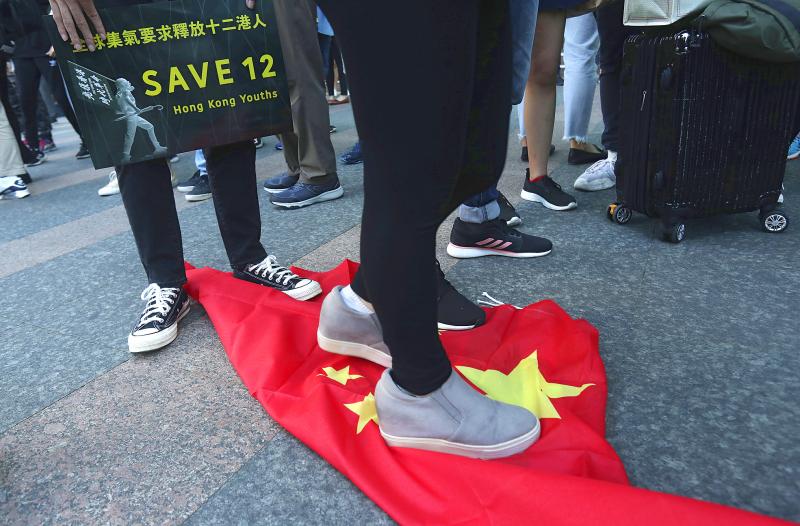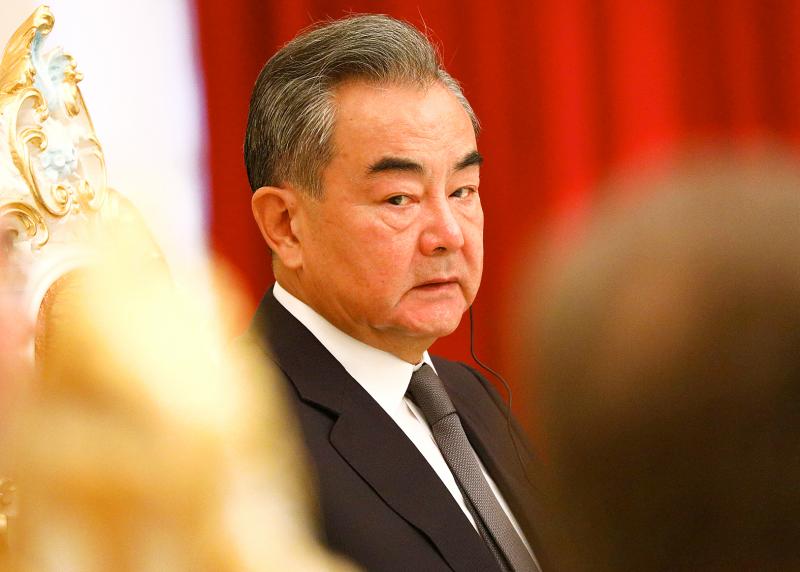Some uplifting news last week: Taiwan Innovative Space received approval to carry out three launches later this year from a site in southern Australia. This program may well develop into a full-blown production and launch capability in Australia in coming years, according to Australian news reports.
Simultaneously, the Asia Times reported that Washington had pressured Taiwan to cease development of a locally-based launch capability using rockets developed in Taiwan. According to the Asia Times, US officials said that “these new rockets could put the island into direct conflict with China as related technologies could easily be weaponized.”
The report said that Washington warned it would stimulate Beijing to conduct more flights and other provocations around Taiwan.

Photo: AP
Official Washington: Taiwan! Do more to defend yourself! Also official Washington: But not that way!
It is true that a rocket launch capability could be weaponized. Indeed, we’re already weaponizing related technology because Taiwan manufactures its own missiles for use against China, something Beijing knows perfectly well. It is hard to see how possessing rockets could make that worse.
It is easy to see, however, how Taiwan possessing a native space launch capability would both reduce Taiwan’s demand for US launches (currently carried out on SpaceX rockets) and eventually, compete with US space launch firms in the world market. What’s Washington’s real motivation here?

Photo: EPA-EFE
An indigenous rocket program can serve as a test bed for developing and improving weapons systems, from communications and guidance systems to missile propulsion. It can also help develop the trained personnel Taiwan needs to make and operate such systems, and create new products for export. Indeed, Taiwan already has plans to help other countries with work on making and testing instruments and payloads for satellites.
But the US said a rocket program that may help Taiwan’s defense might provoke Beijing? Explain, please, how Taiwan can take steps to improve its defense without provoking Beijing.
POLICY, NOT VISCERAL REACTION
There’s a simple rule guiding this discourse: everything provokes Beijing, from phone calls to vaccine donations to displays of Republic of China flags to the use of the word “Taiwan” to arms sales to arrivals of US officials. Any exchange with the outside world “provokes Beijing.”
Why? Because “being provoked” is a policy, not a visceral emotional reaction. Beijing invokes it to deter actions on behalf of Taiwan and other places it wants to aggress on. It mesmerizes policymakers and observers and commentators into imagining that Beijing’s angry reaction is really something important.
For Beijing, US responses that worry about Taiwan “provoking” China are a gold mine of power and control. By “being provoked” Beijing transfers the burden of enforcing the elusive “status quo” onto Washington, which means that it transfers the costs of actions by either Washington or Taiwan onto the US-Taiwan relationship. This lets Beijing shape the US-Taiwan relationship and US thinking on Taiwan.
It also means that there is a constant flow of verbiage arguing that the US should not do X or Y because some important event is occurring in the US-China relationship. Since something is always happening in that relationship, by this logic, the US should never take any action.
POOR, PUT-UPON BEIJING
Watch China carefully — each time it is “provoked” what costs does it impose on itself? “Being provoked” is something that for the last two decades has taken place largely in the media. By shaping the discourse thus, Beijing does not have to take costly, concrete actions that might have negative effects on its economy or relations with other nations.
“Being provoked” is also used to shape media representations of Beijing — to teach the international media to present Taiwan as a troublemaker that is constantly abusing poor, put-upon Beijing.
Indeed, the international media regularly carries Beijing’s water for it, describing actions or events as “sure to anger Beijing!” long before they do so, and of course, trotting out the hackneyed “amidst rising tensions” which I am sure archaeologists have found inscribed on a wall somewhere in the ruins of Pompeii.
The media seldom firmly assigns the cause of the tensions to Beijing, and never notes that “tensions” are policy, to be scaled up or down as needed.
As I have noted many times, when Beijing does not display anger in the wake of a “sure to anger China!” event, the media never returns to the topic to report that nothing happened. This leaves the international readership with the idea that Beijing is always in an abnormal state of anger over Taiwan’s actions, when such anger is mere policy, like fixing quotas for peach imports or deciding acceptable particulate levels for factory emissions.
This trained media response, so many dogs salivating when the bell is rung, not only functions to present Beijing as the victim, it also highlights for Beijing events and actions that it should be responding to and signals that the media will criticize other actors, not Beijing, for taking action.
Remember when President Tsai Ing-wen (蔡英文) phoned and congratulated a newly-elected Donald Trump? The media and commentariat had a total meltdown, with everyone suddenly becoming a Taiwan expert for the duration of the controversy.
Meanwhile, what did China say initially? China’s foreign minister, Wang Yi (王毅), called it a “small action” that “cannot change China’s standing in international society,” according to a Washington Post report. Later, after the international media storm, Zhongnanhai made great noise, summoning the US ambassador.
REDUCED CULPABILITY
What concrete response did China have after this earthshaking event? Nothing. On all sides, it is forgotten as if it never happened, having moved on to the next big “I am now an expert in ... !” event.
One key aspect of the “being provoked” discourse is that it assigns reasons for China’s actions to things that Taiwan or the US does. It is commonplace to write that Beijing did this or that in response to something the US did that Beijing didn’t like.
This media response thus creates a reasonable-seeming explanatory framework in which Beijing is not responsible for its own actions but instead is merely reacting to provocations by others. This reduced agency results in reduced culpability.
Buying into the “being provoked” narrative makes it more difficult for the international media to present China as the aggressor state.
Thus, each time the US says to anyone, but especially to Taiwan, that “you’re provoking Beijing!” it awards victory points to China. Same for the international media.
The truth is simple: when Beijing finally moves on Taiwan, it will do so in its own time, for its own internal reasons and it will grab any excuse to justify its move to the world and its own people, or none at all.
It is saddening to think, on that terrible day when Beijing finally starts the war it is hurtling toward, that numerous docile, well-trained commentators in the international media will be blaming Taiwan for resisting aggression and fighting for democracy.
Thanks in advance, guys.
Notes from Central Taiwan is a column written by long-term resident Michael Turton, who provides incisive commentary informed by three decades of living in and writing about his adoptive country. The views expressed here are his own.

We lay transfixed under our blankets as the silhouettes of manta rays temporarily eclipsed the moon above us, and flickers of shadow at our feet revealed smaller fish darting in and out of the shelter of the sunken ship. Unwilling to close our eyes against this magnificent spectacle, we continued to watch, oohing and aahing, until the darkness and the exhaustion of the day’s events finally caught up with us and we fell into a deep slumber. Falling asleep under 1.5 million gallons of seawater in relative comfort was undoubtedly the highlight of the weekend, but the rest of the tour

Youngdoung Tenzin is living history of modern Tibet. The Chinese government on Dec. 22 last year sanctioned him along with 19 other Canadians who were associated with the Canada Tibet Committee and the Uighur Rights Advocacy Project. A former political chair of the Canadian Tibetan Association of Ontario and community outreach manager for the Canada Tibet Committee, he is now a lecturer and researcher in Environmental Chemistry at the University of Toronto. “I was born into a nomadic Tibetan family in Tibet,” he says. “I came to India in 1999, when I was 11. I even met [His Holiness] the 14th the Dalai

Following the rollercoaster ride of 2025, next year is already shaping up to be dramatic. The ongoing constitutional crises and the nine-in-one local elections are already dominating the landscape. The constitutional crises are the ones to lose sleep over. Though much business is still being conducted, crucial items such as next year’s budget, civil servant pensions and the proposed eight-year NT$1.25 trillion (approx US$40 billion) special defense budget are still being contested. There are, however, two glimmers of hope. One is that the legally contested move by five of the eight grand justices on the Constitutional Court’s ad hoc move

Stepping off the busy through-road at Yongan Market Station, lights flashing, horns honking, I turn down a small side street and into the warm embrace of my favorite hole-in-the-wall gem, the Hoi An Banh Mi shop (越南會安麵包), red flags and yellow lanterns waving outside. “Little sister, we were wondering where you’ve been, we haven’t seen you in ages!” the owners call out with a smile. It’s been seven days. The restaurant is run by Huang Jin-chuan (黃錦泉), who is married to a local, and her little sister Eva, who helps out on weekends, having also moved to New Taipei